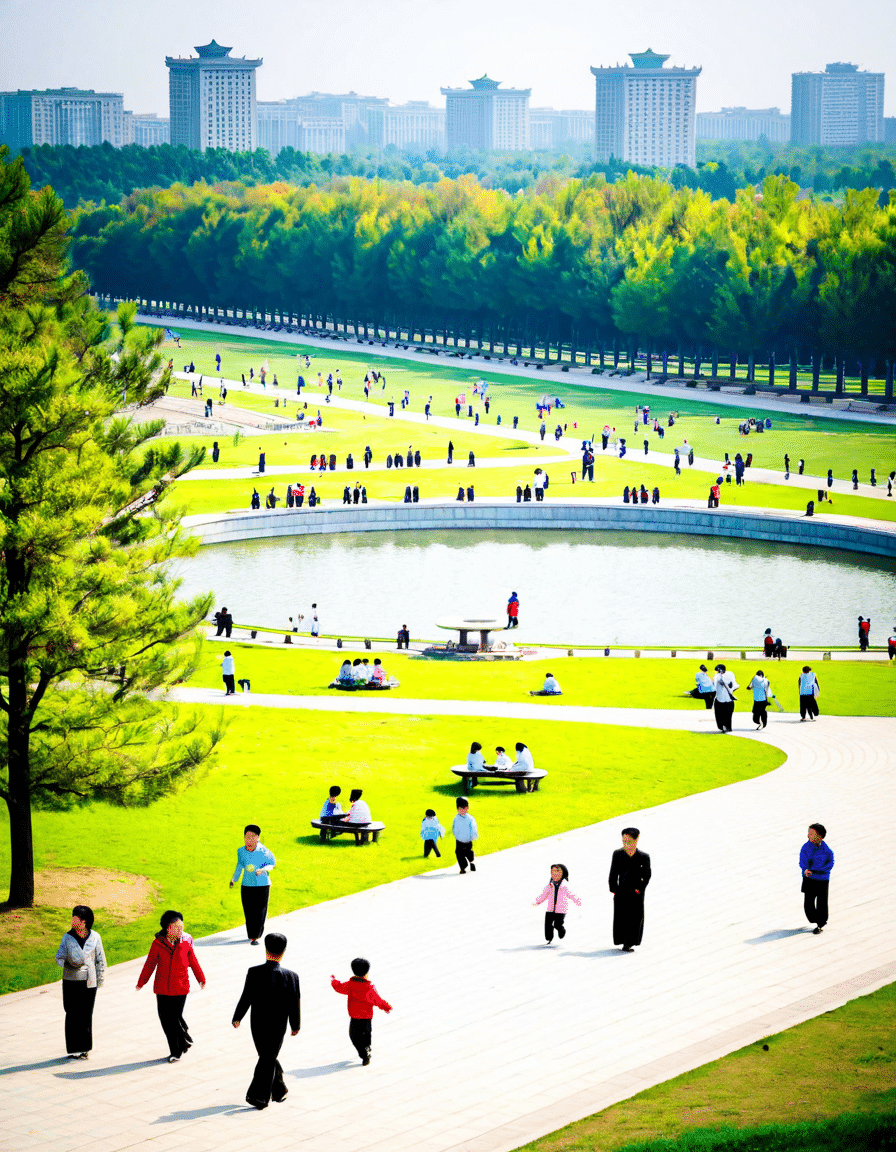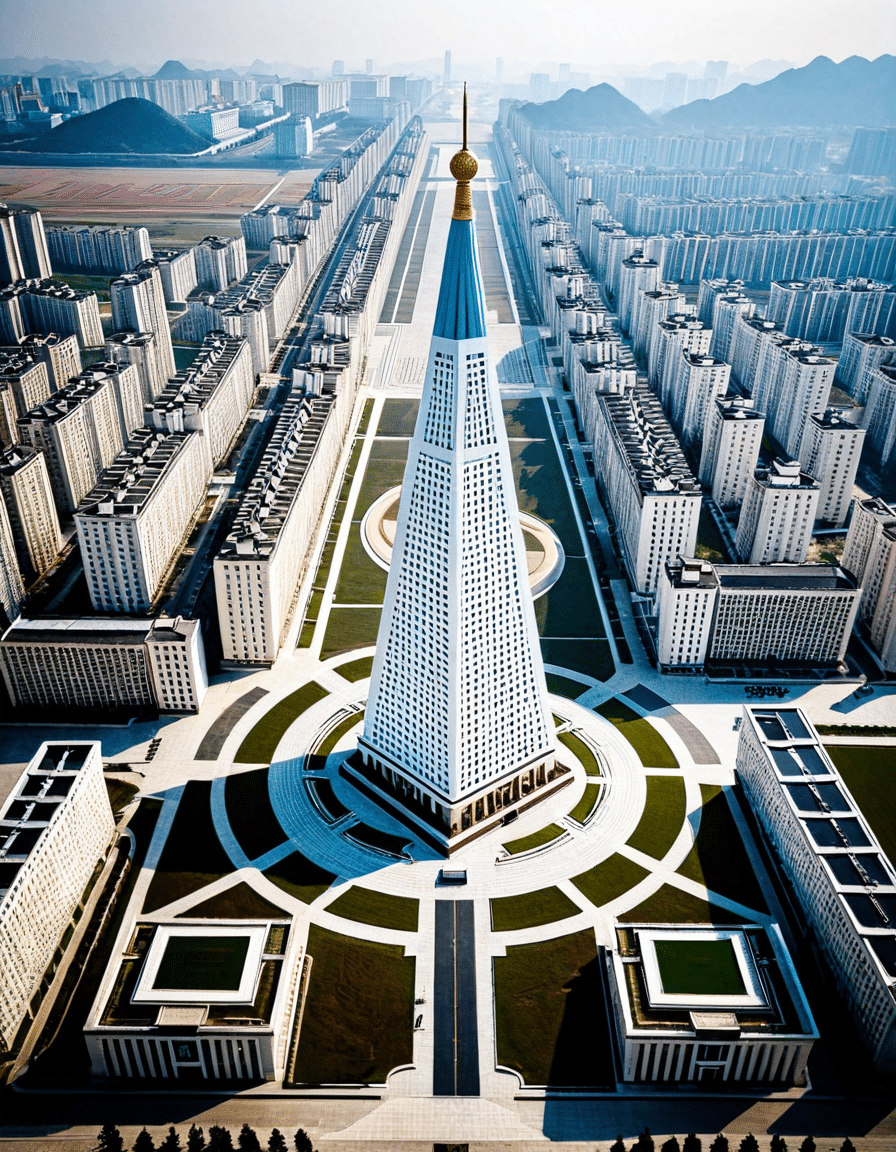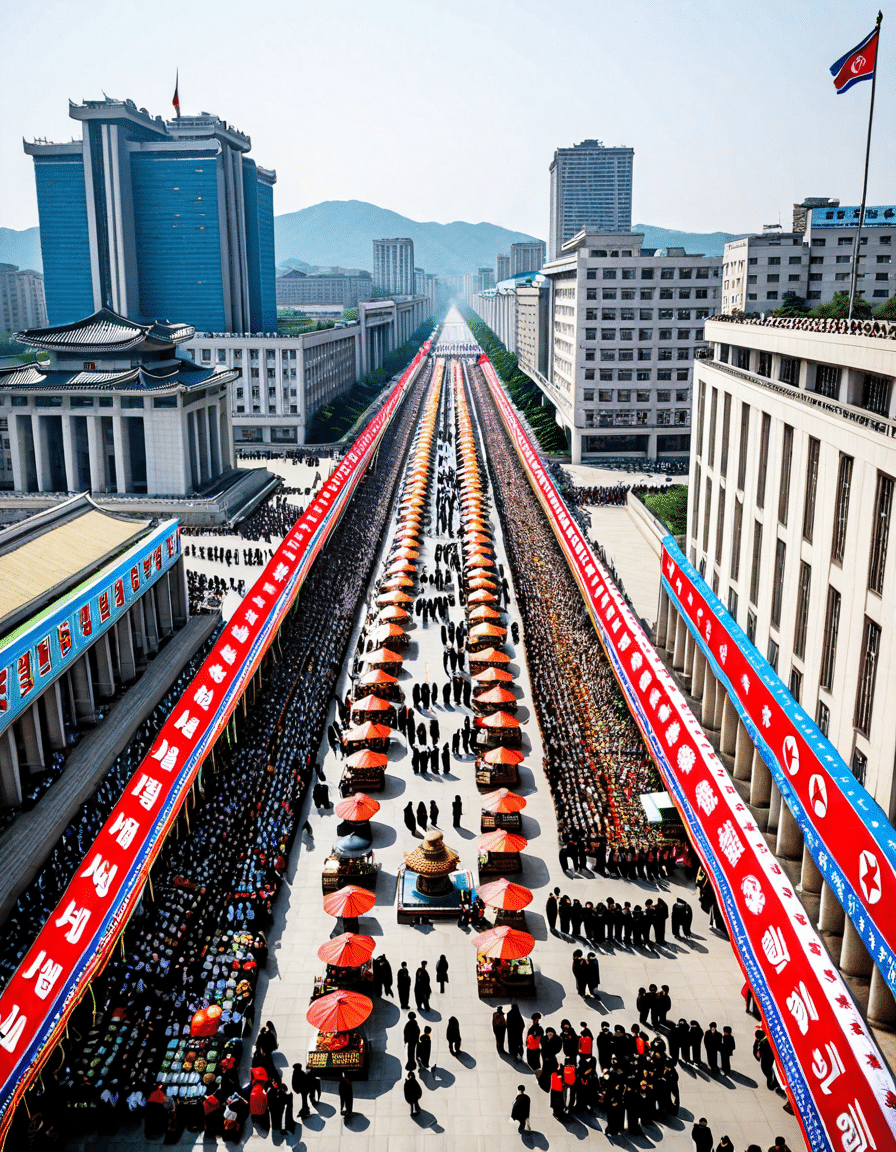When you think about Pyongyang, the capital of North Korea, it conjures images of sweeping parades, grand monuments, and tight political control. Yet, Pyongyang isn’t just the face of politics; it’s a living encyclopedia of North Korean history, culture, and identity. This extraordinary city, steeped in tradition and layered with modern ambition, stands as a symbol of what North Korea is and what it strives to become. Join us as we explore five distinct features that define Pyongyang’s identity and the broader implications of life within this capital.
5 Unique Features that Define Pyongyang’s Identity
1. Architectural Marvels
Pyongyang’s skyline is nothing short of remarkable. The Ryugyong Hotel, looming at 105 stories, showcases the country’s ambitious spirit while earning the nickname “Hotel of Doom” due to its prolonged construction period and iconic design. Designed to symbolize the triumph of North Korean resilience, it now serves as a stark reminder of the nation’s aspirations. Overlooking the city’s bustling life, the Arch of Triumph pays homage to those who fought against Japanese occupation, mirroring its Parisian namesake, yet adding a uniquely North Korean twist.
The architectural layout of Pyongyang reveals much about its leaders’ vision. The blend of modernist buildings with traditional designs creates a distinct atmosphere. From the Kim Il-sung Square, often drenched in vibrant military parades to the tranquil Tower of the Juche Idea, Pyongyang’s structures embody the political ideology that shapes the lives of its citizens.
2. Vibrant Political Culture
In Pyongyang, political life thrives visibly and audibly. The annual Arirang Festival, which gathers thousands for synchronized gymnastics and elaborate performances, serves to showcase not only artistic talent but also national pride. This massive event reinforces the glorification of the regime, acting as a spectacle that spreads a carefully curated narrative of North Korea’s success.
Mass gatherings and political rituals are seamlessly woven into the daily fabric of life. Such events offer a vivid window into the country’s state-sponsored nationalism and the lengths to which the government will go to maintain its ideological narrative. With patriotic fervor underscoring every performance, Pyongyang’s political culture is both mesmerizing and chilling, a place where loyalty is both encouraged and demanded.
3. Symbolism and Monumentalism
Monuments and symbols breathe life into Pyongyang, narrating the story of its past and present through intricate imagery. Kim Il-sung Square is often ground zero for military parades, embodying the essence of showmanship in North Korean society. Statues of Kim Il-sung and Kim Jong-il dot the landscape, their imposing figures serving as constant reminders of the leadership that guides their people.
This perpetual celebration of the Kim family doesn’t just symbolize power—it cultivates a sense of unity among citizens. The local populace often pays homage to these figures, solidifying their roles as indispensable icons entrenched in the nation’s identity. The omnipresence of these monuments magnifies the importance of a shared political ideology, immersing citizens in a continuous narrative of loyalty and devotion.
4. Cultural Institutions
Cultural life in Pyongyang extends beyond mere propaganda; it reflects the societal fabric. The Mansudae Art Studio, famed for producing North Korean art, represents both the state’s artistic vision and the resilience of local expression. Artists here create pieces that not only serve propaganda purposes but also highlight personal aspirations and struggles of the North Korean people.
With galleries and performances, the cultural institutions in Pyongyang encapsulate an ongoing dialogue about art, talent, and the state’s narrative. It’s a community rich in creativity, yet firmly rooted in ideology. These institutions serve as platforms for both artistic endeavors and the affirmation of loyalty to the regime.
5. Food and Culinary Heritage
The culinary scene in Pyongyang offers a feast for both the palate and the mind. Dishes like Pyongyang cold noodles (naengmyeon) exemplify North Korean culinary heritage, reflecting the local ingredients and traditions. Eating at establishments like the Okryu-kwan Restaurant, famous for its chilled noodles, presents an experience steeped in the country’s culinary diplomacy.
Dining is not merely a task; it’s a social occasion where food connects people with their cultural roots. The juxtaposition of traditional dishes in a modern setting mirrors the duality of Pyongyang itself, highlighting both simplicity and sophistication while serving as a cultural touchstone for the city’s unique identity.

The Dual Nature of Pyongyang: A City of Contrasts
Modernization Versus Tradition
Pyongyang is a study in contrasts. On one hand, the city boasts modern infrastructure advancements like the Pyongyang Metro, which is not only a critical transit system but also an architectural wonder. Public transport systems, alongside modern overpass bridges, signify North Korea’s attempts at modernization.
Conversely, traditional practices interlace deeply into the daily routines of citizens. Local festivals celebrate age-old customs, allowing citizens to connect with their heritage while navigating modern life. This duality provides insights into North Korea’s struggle to maintain its historical narrative alongside the pressures of contemporary society.
Economic Development Amidst Traditional Values
In the economic sector, Pyongyang demonstrates a controlled economy slowly inching toward modernization. Although state-run enterprises dominate, there’s a noticeable emergence of private endeavors, particularly in tourism. This dynamic creates a fascinating tension between North Korea’s rigid system and the potential growth of the private sector.
With foreign visitors increasingly making their way to the capital, opportunities arise for cultural exchange and potential economic reform. This intersection of tourism and local economy invites deeper discussions about the future direction of Pyongyang and North Korea as a whole.
A Unique Perspective on Daily Life in Pyongyang
Everyday life in Pyongyang reflects the pervasive influence of the state, dictating everything from education to career paths. Education in the capital is infused with the teachings of the Kim family, shaping young minds from an early age. Textbooks highlight the regime’s ideology, honing perspectives that align with state narratives.
Employment is equally orchestrated by the government, emphasizing loyalty as a crucial currency. In such a structured environment, individuals often find their jobs predetermined based on their family background and political affiliation, cementing the social structure in place.

Creating a Narrative: Pyongyang in Global Context
International Perceptions and Media Representation
The portrayal of Pyongyang in global media is often sensational, overshadowing the nuanced life experiences of its citizens. While many headlines focus on nuclear threats or military displays, a deeper understanding reveals the complexities of daily life. By contrasting the official state narrative with on-the-ground realities, Pyongyang’s citizens are humanized beyond political affiliation.
Such portrayals highlight a pressing need for empathy in the discussions surrounding North Korea. Recognizing the richness of the culture, traditional practices, and individual stories shows a different side of this extraordinary capital.
The Future of Pyongyang: Potential Transformations
Looking ahead, the fate of Pyongyang remains uncertain amid shifting international relations and internal dynamics. Potential reforms could reshape the city’s identity, inviting changes that embrace modernity while grappling with its entrenched ideology.
As Pyongyang continues to oscillate between rigidity and openness, there lies a glimmer of hope for transformation. The growing interactions with the outside world could foster a greater understanding, slowly unveiling the multifaceted existence of this extraordinary capital.
In summary, Pyongyang stands as a fascinating focal point of ideology, culture, and identity. It’s a city woven into the fabric of North Korea’s history, exemplifying ambition and tradition. Understanding Pyongyang offers crucial insights not just into this unique capital but into the broader dynamics of North Korean society as well.
Pyongyang: The Extraordinary Capital of North Korea
A City of Surprising Contrasts
Pyongyang isn’t just a capital; it’s a fascinating blend of history and modernity. Did you know that the city was originally established over 2,000 years ago? This long history has given Pyongyang a unique personality, contrasting the old with the new seamlessly. You might be amazed to learn that, despite its political atmosphere, the city’s cultural scene thrives. In fact, Pyongyang hosts art performances and showcase events that rival even big productions seen in major cities around the globe, such as the much-anticipated upcoming Movies To watch 2024 list, which is set to feature some blockbuster films.
Architectural Wonders
One of the most striking features of Pyongyang is its remarkable architecture. From the grand Kim Il-sung Square to the towering Ryugyong Hotel, the skyline has its own flair. Interestingly, this hotel has been called the “Hotel of Doom” due to its delayed construction, taking nearly 30 years to complete! In its own way, it underscores the city’s ambition, much like designer Zac Posen who aims to bend fashion rules with his eye-catching styles. So, when you gaze at these towering edifices in Pyongyang, think of them not only as buildings but as emblems of the city’s determination to make a mark.
Cultural Nuggets
You may find it surprising that despite North Korea’s reclusive reputation, Pyongyang showcases a lively set of traditions and celebrations. For instance, the Mass Games, featuring thousands of performers in synchronized dance and gymnastics, is a spectacle that’s hard to forget. It’s akin to the artistry behind Kirby: Return to Dream Land, where players engage in vibrant, strategic gameplay. And speaking of whimsy, did you know Pyongyang even has an amusement park? It’s a peculiar yet spirited aspect of the city that echoes the joy of El Gallo, a character that plays upon themes of redemption and festivity.
So, whether you’re intrigued by the history or captivated by the culture, Pyongyang offers a unique tapestry of experiences. It indeed holds incredible stories beneath its surface, bouncing back like the resilient Rio Grande river. The next time you hear about changes or happenings in this city, remember there’s a rich narrative behind each headline, making it well worth your attention.




